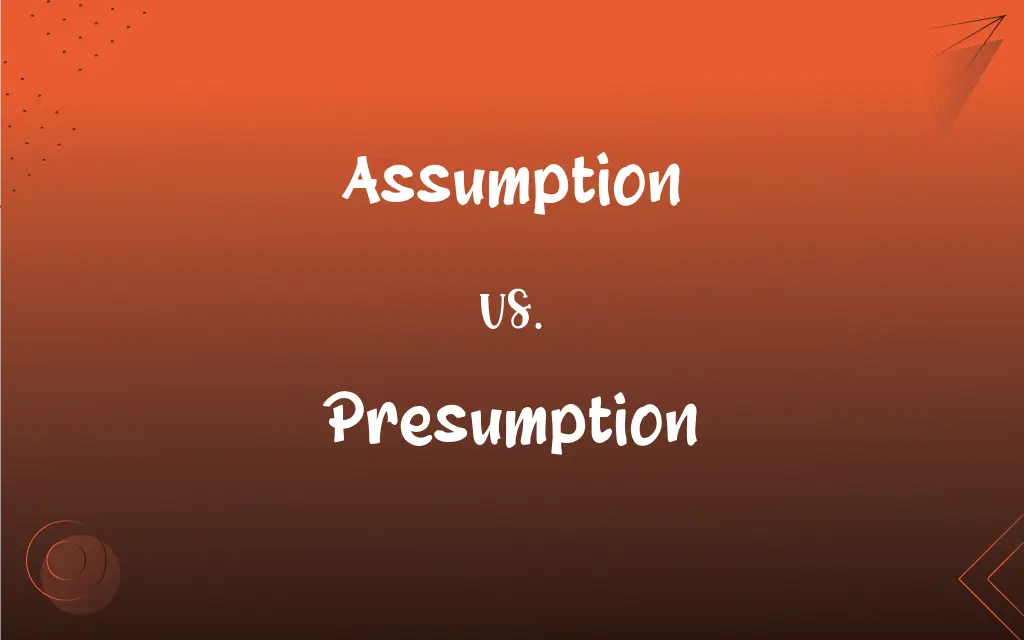Assumption vs. Presumption: What's the Difference?
Edited by Aimie Carlson || By Janet White || Published on January 15, 2024
Assumption is a belief accepted as true without proof. Presumption is a belief based on probability or tentative evidence.

Key Differences
Assumption implies a concept or belief accepted as true without the need for proof or evidence. It often forms the basis of a theory or argument. Presumption, on the other hand, is based on some degree of evidence or probability, albeit not conclusive.
An assumption is often used to fill a gap in knowledge, providing a starting point for reasoning or argument. Presumption leans more towards an inference or expectation based on trends, past experiences, or partial evidence.
In logic and reasoning, an assumption is a premise that is taken for granted. In law and daily language, presumption implies a favorable belief about something based on likelihood.
Assumptions are often foundational in theoretical or hypothetical scenarios, used to explore possibilities. Presumptions are more practical, guiding decision-making under uncertainty but with some basis.
An assumption can be challenged and replaced if found incorrect. A presumption is more flexible and open to revision with new evidence or information.
ADVERTISEMENT
Comparison Chart
Basis
Accepted without proof
Based on probability or partial evidence
Use
Filling knowledge gaps, forming theories
Inferences based on trends or experiences
Nature
Often foundational and theoretical
Practical, guiding decisions under uncertainty
Flexibility
Can be replaced if incorrect
Open to revision with new evidence
Application
Theoretical scenarios, reasoning
Decision-making, legal inferences
ADVERTISEMENT
Assumption and Presumption Definitions
Assumption
A concept presumed to be true in the absence of proof.
His decision was based on the assumption that all team members agree.
Presumption
A belief based on reasonable evidence or probability.
The presumption was that the company's profits would continue to rise.
Assumption
An underlying premise or idea taken for granted.
Her argument was built on the assumption of unlimited resources.
Presumption
A provisional belief subject to future verification.
There was a general presumption of innocence until proven guilty.
Assumption
A starting point in logic or theory without empirical evidence.
The assumption in his hypothesis was not supported by data.
Presumption
An inference made based on past experiences or trends.
Her presumption that the project would be delayed was correct.
Assumption
A belief accepted as true without proof.
The theory was based on the assumption that the market remains stable.
Presumption
An assumption made with some degree of evidence or likelihood.
Based on his track record, the presumption of his success was high.
Assumption
An accepted idea used to support arguments or decisions.
They made plans under the assumption that the weather would be good.
Presumption
A hypothesis or expectation formed from partial evidence.
The presumption of market growth was based on current trends.
Assumption
The act of taking to or upon oneself
Assumption of an obligation.
Presumption
Behavior or attitude that is boldly arrogant or offensive; effrontery
She was offended at the stranger's presumption in speaking in such an casual manner.
Assumption
The act of taking possession or asserting a claim
Assumption of command.
FAQs
What defines an assumption?
A belief accepted without proof.
Can presumptions be legally binding?
In some legal contexts, yes.
Is an assumption always unproven?
Generally, but it can be based on logical reasoning.
Do assumptions require justification?
Not necessarily, they're often accepted at face value.
How do presumptions aid in legal proceedings?
They provide a starting point for evidence evaluation.
What makes a presumption different?
It's based on probability or some evidence.
Are assumptions used in scientific theories?
Yes, often as foundational concepts.
Are presumptions used in decision-making?
Yes, especially under uncertainty.
Can an assumption turn into a fact?
With evidence, it can be validated as fact.
Can assumptions lead to biases?
Yes, if not critically evaluated.
How reliable are presumptions?
They're more reliable than assumptions but not absolute.
Can an assumption be empirical?
Rarely, as they're typically theoretical.
Are assumptions used in mathematical models?
Yes, they're crucial in setting model parameters.
Is a presumption always based on past data?
Often, but not exclusively.
Is a presumption always correct?
Not always, it's subject to verification.
What happens when new evidence contradicts a presumption?
The presumption can be revised or discarded.
Are assumptions static?
They can be, but are open to change with new information.
Can presumptions be harmful?
If not verified, they can lead to incorrect conclusions.
How do assumptions affect arguments?
They provide a base but can weaken arguments if unfounded.
Do presumptions require critical analysis?
Yes, they should be evaluated against evidence.
About Author
Written by
Janet WhiteJanet White has been an esteemed writer and blogger for Difference Wiki. Holding a Master's degree in Science and Medical Journalism from the prestigious Boston University, she has consistently demonstrated her expertise and passion for her field. When she's not immersed in her work, Janet relishes her time exercising, delving into a good book, and cherishing moments with friends and family.
Edited by
Aimie CarlsonAimie Carlson, holding a master's degree in English literature, is a fervent English language enthusiast. She lends her writing talents to Difference Wiki, a prominent website that specializes in comparisons, offering readers insightful analyses that both captivate and inform.

































































